While everyone talks about sleepless nights and baby snuggles when you’re postpartum, there’s a lot less discussion about what’s happening inside your body after delivery—especially when it comes to postpartum iron deficiency.
Most women have their iron levels checked at least once during pregnancy. But what many don’t realize is that iron deficiency doesn’t magically disappear after giving birth. In fact, low iron after birth is incredibly common—and a postpartum iron deficiency can have a profound impact on your mental and physical health.
In this post, we’re diving deep into why iron is so essential, what causes postpartum iron deficiency, how to recognize symptoms, and how to restore your levels with iron-rich foods and supplements. Whether you had a vaginal birth or C-section, this guide is for you.
Why Iron Is Important in the Human Body
Iron plays a critical role in the body—it’s the mineral responsible for helping red blood cells transport oxygen (source). Without enough iron, your blood can’t carry adequate oxygen to your tissues, which means everything from your brain to your muscles can be affected.
This is why low iron symptoms in women can feel like complete exhaustion, brain fog, dizziness, and weakness. Your body is literally struggling to function because it isn’t getting the oxygen it needs.
Here are just a few of the functions iron supports:
- Energy production and metabolism
- Cognitive function and concentration
- Immune system health
- Hormone regulation
- Mood and sleep regulation
Low iron doesn’t just affect your energy levels—it can affect nearly every aspect of your physical and mental well-being.
What Causes Low Iron After Birth?
During pregnancy, your body’s demand for iron increases significantly due to increased blood volume and the needs of the growing baby. But after birth, especially if there was significant blood loss during delivery (including C-section), iron levels can plummet.
And yet, despite all the emphasis on iron during pregnancy, most women aren’t told to get their iron tested postpartum. In my own experience, I had labs drawn during pregnancy but never again after delivery—even though I experienced fatigue, hair loss, and anxiety. It wasn’t until I finally asked for a ferritin test (a measure of stored iron) that I learned I was severely depleted.
Iron deficiency often precedes anemia (a clinical diagnosis based on low hemoglobin). So even if you’re not officially anemic, you can still experience the effects of iron deficiency.
Some common causes of postpartum iron deficiency anemia include:
- Blood loss during delivery (including hemorrhage or even average vaginal/C-section birth)
- Low iron levels during pregnancy
- Poor dietary intake of iron-rich foods
- Short inter-pregnancy intervals
- Inflammation or poor gut absorption
Low Iron After Birth Symptoms
Wondering if you might be dealing with iron deficiency? Here are some low iron symptoms in women, especially postpartum:
- Persistent fatigue or exhaustion (even after sleeping)
- Low mood, postpartum depression, or postpartum anxiety
- Hair shedding
- Dizziness or lightheadedness
- Cold hands and feet
- Heart palpitations or racing heart
- Insomnia or trouble staying asleep (yes, low iron and insomnia are linked!)
- Brain fog or difficulty concentrating
- Shortness of breath
- Pale skin or nail beds
- Cravings for non-food items (ice, dirt, etc.)
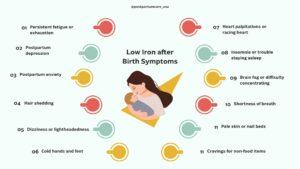
Low iron and postpartum depression or anxiety are often connected because iron is essential for neurotransmitter function. It helps regulate dopamine, serotonin, and other chemicals that affect mood. When levels are low, it can mimic or worsen symptoms of depression and anxiety.
How Long Should You Take Iron Supplements After Delivery?
There’s no one-size-fits-all answer here, but a general guideline is to continue taking iron for at least 6–12 weeks postpartum—longer if your ferritin levels are still low.
The WHO recommends that lactating women consume between 10–30 mg of iron per day, depending on dietary absorption. However, many practitioners recommend continuing the pregnancy dosage (27 mg/day) for several weeks postpartum, especially if there was blood loss or signs of deficiency.
Some women may need even more, especially if they’re breastfeeding, not menstruating yet, or not eating much red meat. This is why it’s important to test—don’t just guess.
Postpartum Iron Supplement Dosage & Types
The best postpartum iron supplement dosage depends on your lab work, symptoms, and dietary intake. In general:
- Mild deficiency: 30–60 mg/day elemental iron
- Moderate-severe deficiency or anemia: 60–120 mg/day elemental iron
The most commonly recommended types of iron include:
- Ferrous sulfate (standard but often causes constipation and nausea)
- Ferrous bisglycinate (gentler on the gut, highly absorbable)
- Heme iron polypeptide (from animal sources, well absorbed)
Always pair iron with vitamin C to enhance absorption. Avoid taking it with calcium, coffee, or high-fiber meals, which can block absorption.
Best Iron Tablets After Delivery
Some postpartum-friendly iron supplements to consider:
- Needed Iron Supplement (Ferrous Bisglycinate) – gentle and easy to dose
- MegaFood Blood Builder – includes iron, folate, and B12 for energy
- Floradix Liquid Iron – a plant-based, low-dose option for those with sensitive stomachs
Again, always consult your provider or functional medicine practitioner to choose what’s best for your body.
Iron-Rich Foods for Postpartum Moms
Food is a powerful tool for recovery, and adding more iron-rich foods into your daily meals can help replenish stores, especially when combined with supplements.
Heme Iron (animal-based, best absorbed)
- Grass-fed beef
- Lamb
- Chicken thighs
- Turkey
- Liver (if tolerated)
- Salmon and tuna
Non-Heme Iron (plant-based, needs vitamin C for absorption)
- Lentils
- Black beans
- Chickpeas
- Tofu
- Pumpkin seeds
- Spinach and Swiss chard
- Quinoa
Pro tip: Sauté spinach in olive oil and garlic, then squeeze lemon juice on top to increase iron absorption!
Low Iron After C-Section Symptoms
Women who have C-sections are especially at risk for postpartum anemia due to higher likelihood of blood loss during surgery.
In addition to the symptoms listed above, postpartum anemia in C-section moms might look like:
- Delayed wound healing
- Increased risk of infection
- Dizziness or fainting when standing
- Excessive fatigue impacting milk supply or bonding
This is why iron postpartum supplementation should be a routine part of C-section recovery, yet it’s rarely emphasized in traditional postpartum care.
Treatment of Postpartum Anemia
The treatment of postpartum anemia involves addressing both the underlying cause (usually iron loss or deficiency) and replenishing stores through supplements, food, and sometimes IV iron if levels are extremely low or oral supplements aren’t tolerated.
Ask your provider for a full iron panel including:
- Ferritin (stored iron)
- Hemoglobin
- Iron saturation
- Total Iron Binding Capacity (TIBC)
A ferritin level below 30 ng/mL is generally considered low in postpartum women, even if hemoglobin is in normal range.
Postpartum iron deficiency is common—but it’s not normal.
Unfortunately, for proper dosing, you can’t go off of symptoms alone. You need labs!
If you’re dealing with symptoms like exhaustion, mood swings, or insomnia, it might not be “just baby blues.” It could be your body crying out for support. Getting your iron tested and supplementing properly can make a massive difference in how you feel day-to-day—and how you show up for your baby and yourself.
Your recovery is worth investing in. Let this be the nudge to prioritize your health. Ask for labs, seek real answers, and know that it’s possible to feel like you again. You might just be low on iron.
Pin This for Later:
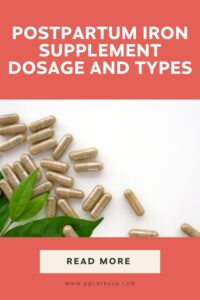
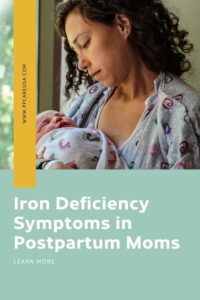
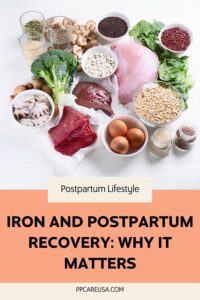
Postnatal Depletion
Meet the Team
Our Services
Supplements
A virtual healthcare clinic that helps postpartum mamas recover from postnatal depletion syndrome with a holistic approach.
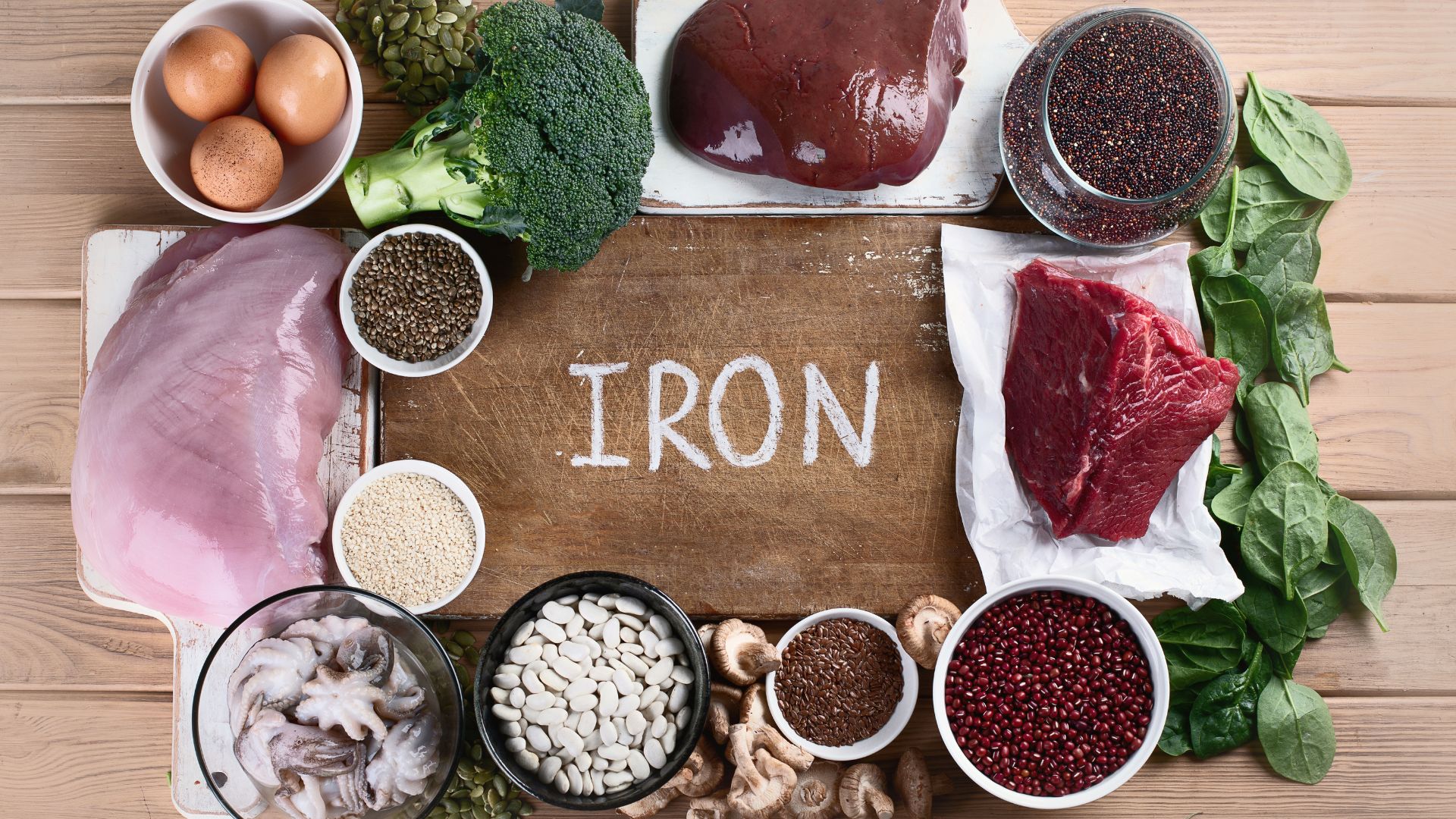
Get in touch